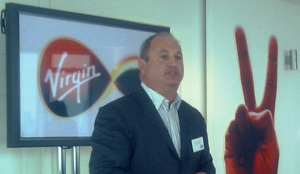

Virgin Media Business will today launch a flat rate business Ethernet-on-fibre service which offers “more bandwidth than you think you need,” with uncontended, symmetrical services at 100Mbps or 1Gbps.
The service uses the core network that Virgin has built on the assets of the former cable companies and will offer the services at a “small premium” to businesses currently on 10Mbps or 100Mbps leased lines, according to a Virgin executive. The service can be offered at a lower price than competing leased line services because the bandwidth that it uses would otherwise go to waste, as the amount of traffic on a consumer network drops dramatically during working hours.
The 100Mbps service costs £12,000 per year, or £13,000 for a managed service, while the 1Gbps service costs £22,000 or £25,000 for a managed service which includes router installation and proactive network management.
The service is for directly-connected users, and not for resellers, and can be installed within 60 days from order. Although this sounds a long time, the local loop connection to the user can involve digging up the road; being able to afford a higher speed to start with should mean that is a one-off cost and a one-off delay, Virgin Media spokespeople pointed out.
Virgin Media Business has a very strong fibre network, which was built up by NTL and TeleWest and is mostly used by consumers in the evening, explained chief operating officer Andrew Barron: “It’s bankrupted two companies – it’s our pride and joy!” Big Red Internet is able to offer an uncontended service on that during the day.
Since taking over the ntl and TeleWest brands, Virgin first sorted out its customer service, and then got its balance sheet under control, said Barron. “We can fund and finance projects, and take a long-term perspective.”
While Virgin Media has been rolling out 50Mbps, using the DOCSYS standard, to large parts of the country, and promising 100Mbps broadband using fibre-to the-cabinet, Virgin Media Business has launched Ethernet extension services up to 10Gbps. The Big Red Internet offering takes that service and simplifies it, said Barron.
“We are an asset-based carrier,” said Barron. “It effectively costs us nothing to offer this service.” The peak demand from Virgin consumers is around 10pm at night, and the network is largely empty during the day. “Our competitors build networks dimensioned around business-to-business, and buy access from BT,” he said.
The company has promised to divulge prices before customers are asked to start putting down real money for the service – the service will be available in managed and unmanaged versions.
At the launch event, Barron claimed that Virgin’s broadband roll-out had now met the government’s original target for fast broadband in Stephen Carter’s Broadband Britain report, but providing universal access at 2Mbps would be trickier. “Universal access means reaching areas which are not economical,” said Barron. “If the government lets us use unconventional methods such as using electricity poles, we will push ahead as fast as it is economic to do so.”
But will Beijing or ByteDance allow sale? Amazon joins potential bidders for TikTok in US,…
Elon Musk dismisses report that Trump told cabinet that he expects Musk to leave his…
Mark Zuckerberg is reportedly lobbying President Donald Trump for a settlement to avoid antitrust trial…
As global markets reel from Trump's tariffs, the price of Bitcoin slides as investors seek…
Semiconductor imports are free of Trump's tariff war, but concerns remain over imports of smartphones…